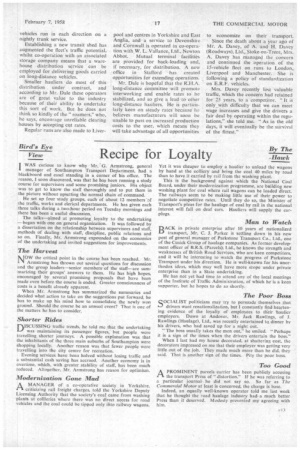Recipe for Loyalty
Page 61

If you've noticed an error in this article please click here to report it so we can fix it.
Bird's Eye View By The -Hawk
I WAS curious to know why Mr.. G. Armstrong, general manager of Southampton Transport Department, had a blackboard and easel standing in a corner of his office. The reason, I soon discovered, was that he has been running a study course for supervisors and some promising juniors. His object was to get to know the staff thoroughly and to put them in the picture without upsetting the normal chain of command. He set up four study groups, each of about 12 members of the traffic, works and clerical departments. He has given each three talks during a two-hour period on Tuesday mornings and there has been a useful discussion.
The talks—aimed at promoting loyalty to the undertaking --began with one on general organization. It was followed by a dissertation on the relationship between supervisors and staff, methods of dealing with staff, discipline, public relations and so on. Finally, Mr. Armstrong expounded on the economics of the undertaking and invited suggestions for improvements.
The Harvest
NOW the critical point in the course has been reached. Mr. Armstrong has thrown out several questions for discussion and the group leaders—senior members of the staff—are summarizing their groups' answers to them. He has high hopes, encouraged by several promising proposals that have been made even before the course is ended. Greater consciousness of costs is a benefit already apparent.
When Mr. Armstrong has summarized the summaries and decided what action to take on the suggestions put forward, he has to make up his mind how to consolidate the newly won ground. Should the course be an annual event? That is one of the matters he has to consider.
Shorter Rides
nISCUSSING traffic trends, he told me that the undertaking
was maintaining its passenger figures, but people were travelling shorter journeys. A possible explanation was that the inhabitants of the three main suburbs of Southampton were shopping locally. Another reason was that fewer people were travelling into the city centre for recreation.
Evening services have been halved without losing traffic and a substantial cash saving has accrued. Another economy is in overtime, which, with greater stability of staff, has been much reduced. Altogether. Mr. Armstrong has reason for optimism.
Modernization Gone Mad
A MANAGER of a co-operative society in Yorkshire,
criticizing rail freight charges, told the Yorkshire Deputy Licensing Authority that the society's coal came from washing plants at collieries where there was no direct access for road vehicles and the coal could be tipped only ibto railway wagons. Yet it was cheaper to employ a haulier to unload the wagons by hand at the colliery and bring the coal 40 miles by road than to have it carried by rail from the washing plant.
This is the background against which the National Coal Board, under their modernization programme, are building new washing plant for coal where rail wagons can be loaded direct. The railways seem to be making little use of their power to negotiate competitive rates. Until they do so, the Minister of Transport's pleas for the haulage of coal by rail in the national interest will fall on deaf ears. Hauliers will supply the earplugs.
Man to Watch
BACK in private enterprise after 10 years of nationalized transport, Mr. C. .I. Parker is settling down in his new post of general manager of Parkstone Transport Co., Ltd., one of the Cusick Group of haulage companies. As former development officer of B.R.S. (Parcels), Ltd., he knows the strength and weaknesses of British Road Services, who are keen competitors, and it will be interesting to watch the progress of Parkstone Transport under his direction. He is well-known for his unorthodox ideas, which may well have more scope under private enterprise than in a State undertaking.
He has not yet had time to attend any of the local meetings of the Institute of Traffic Administration, of which he is a keen supporter, but he hopes to do so shortly.
The Poor Boss
QOCIALIST politicians may try to persuade themselves that
drivers want renationalization, but I constantly find heartening evidence of the loyalty of employees to their 'haulier employers. Dawn at Andover, Mr. Jack Rawlings, of I. Rawlings (Haulage). Ltd., was recently entertained tQ dinner by his drivers, who had saved up for a night out.
"The boss usually takes the men out," he smiled. "Perhaps it is a sign of the times when the drivers entertain the boss."
When I last had my house decorated, at shattering cost, the decorators impressed on me that their employer was getting very little out of the job. They made much more than he did, they said. That is another sign of the times. Pity the poor boss.
Too Good
APROMINENT parcels carrier has been publicly accusing the transport Press of " distortion." If he was referring to a particular journal he did not say so. So far as The Commercial Motor at least is concerned, the charge is base.
Indeed, an equally well-known operator told me last week that he thought the road haulage industry had-a much better Press than it deserved. Modesty prevented my agreeing with him,
































































































































